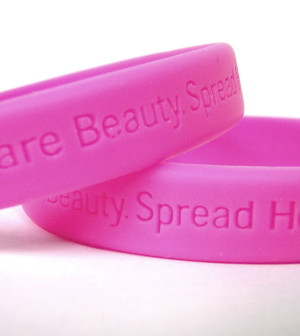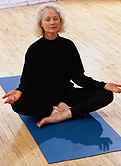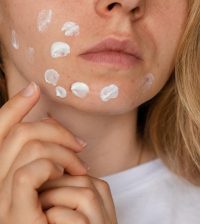- Total Hip Replacement Recovery: Everything You Need To Know
- How Savvy Habits May Help Head Off Dementia
- HHS Launches New Autism Study Despite Experts’ Concerns
- CDC Urges Extra Measles Shot For Some U.S. Travelers Amid Outbreak
- Showerhead Water Limits Rescinded as Trump Targets Household Appliances
- Most Women Aren’t Clear When Menopause Might Start
- New Visual Test For Autism Could Aid Earlier Diagnosis
- Half-Million Children Could Die If U.S. AIDS Relief Is Dropped
- Seasonal Allergies Likely To Grow Worse Under Climate Change
- First Baby Born From Robot-Controlled IVF
Yoga Fails to Cool Hot Flashes, But May Aid Sleep


THURSDAY, Oct. 10Practicing yoga may not ease menopausal hot flashes, but it might help women sleep a bit easier, a new clinical trial suggests.
Right now, hormone therapy is the most effective treatment for the hot flashes and night sweats many women develop as they go through menopause. But hormones have been linked to risks like blood clots and heart attack, so many women want alternatives.
Some small studies have suggested that yoga can reduce the frequency and severity of hot flashes — possibly by calming nervous system activity. But that was not the case in this latest trial, which randomly assigned 249 women to either take gentle yoga classes for 12 weeks, or stick with their usual activities.
By the study’s end, women in the yoga group were having fewer hot flashes each day — but so were those in the comparison group.
On the other hand, the yoga practitioners did seem to be sleeping better.
“For the time being, there seems to be little sound evidence that yoga is helpful for hot flashes,” said lead researcher Katherine Newton, of the Group Health Research Institute in Seattle.
“However, we did find yoga to be modestly helpful for insomnia,” Newton added. That’s important, she noted, because sleep problems are one of the most common reasons that women seek some kind of treatment as they go through menopause.
“If insomnia is bothering a woman,” Newton said, “this style of gentle yoga, practiced regularly, may be of benefit.”
The study was funded by the U.S. National Institutes of Health and recently published online in the journal Menopause.
It may be too soon to write off yoga as a hot flash remedy, according to another researcher not involved in the study.
Yoga should be seen as a lifestyle change, and it takes time for people to work it into their lives, noted Nancy Woods, a professor at the University of Washington School of Nursing who studies menopause symptoms.
“It’s a practice,” she said. “You have to learn the poses, get comfortable with them, and then integrate these practices into your daily life.”
So it’s possible that women need longer than 12 weeks of yoga to see benefits for their hot flashes, according to Woods. Medications would be expected to work in that timeframe, she said, but a lifestyle change “may not have the quick effect that a drug does.”
“Women who are already doing yoga should not stop because of this study,” Woods added.
And if women with menopause symptoms are interested in starting yoga, she added, it’s worth a try. Even if it doesn’t cool their hot flashes, Woods noted, there could be other gains, like reduced stress, better sleep and the health benefits of physical exercise.
The findings are based on 249 women who were suffering seven to eight hot flashes per day, on average; 107 were randomly assigned to take up yoga, while the rest stuck with their normal daily routines.
Women in the yoga group took 12 weekly classes that included gentle yoga poses, breathing exercises, meditation and relaxation. They were also given a DVD and yoga props to use at home.
After 12 weeks, the women were having fewer hot flashes — less than five per day, on average. But women in the comparison group reported a similar change. The only difference between the groups was in insomnia symptoms, which improved to a greater degree in the yoga group.
Woods said that women who feel they need a quick remedy for their hot flashes might want to talk to their doctor about hormone therapy. But if they’re interested in a lifestyle change, yoga could be part of that.
“There’s no right or wrong answer,” Woods said.
But both she and Newton said that, as with any type of exercise, women should check with their health provider before starting a new routine. There are also many different styles of yoga, some of which are vigorous and may not be appropriate for everyone.
So before you jump into a yoga class, it’s a good idea, according to Woods, to talk to someone at the center about the style taught there.
You’ll also have to foot the bill. Yoga class prices vary, but typically range between $10 and $20.
More information
The U.S. National Center for Complementary and Alternative Medicine has more on alternative therapies for menopause symptoms.
Source: HealthDay
Copyright © 2025 HealthDay. All rights reserved.










